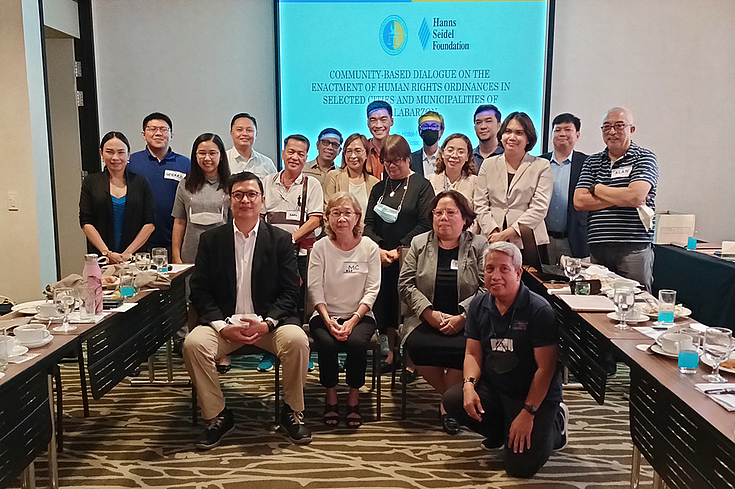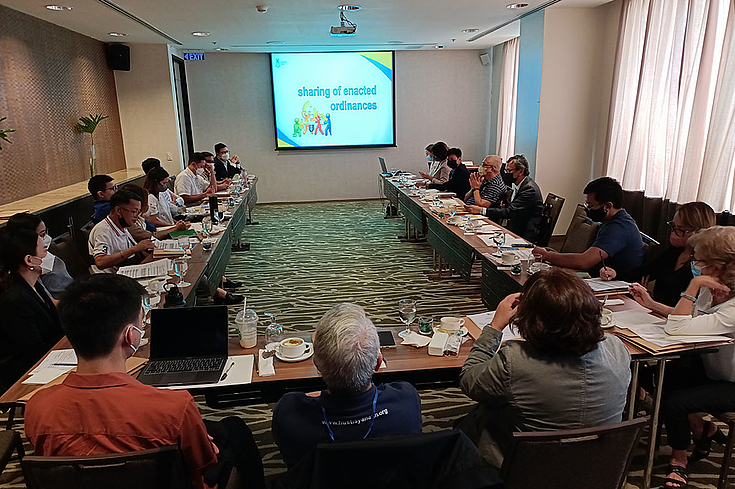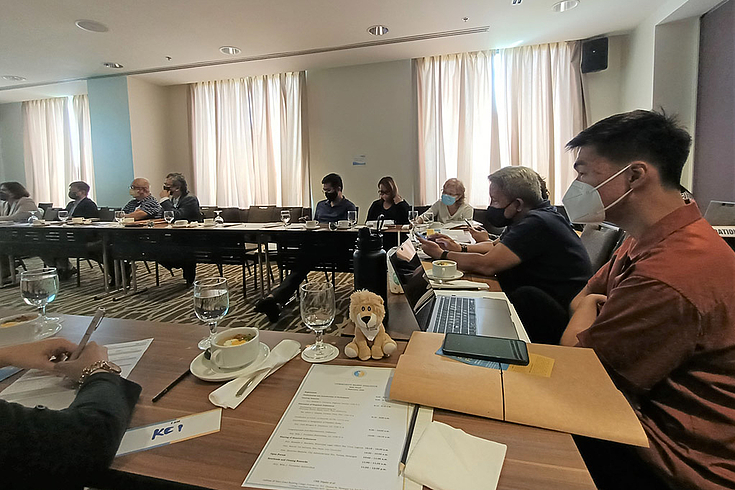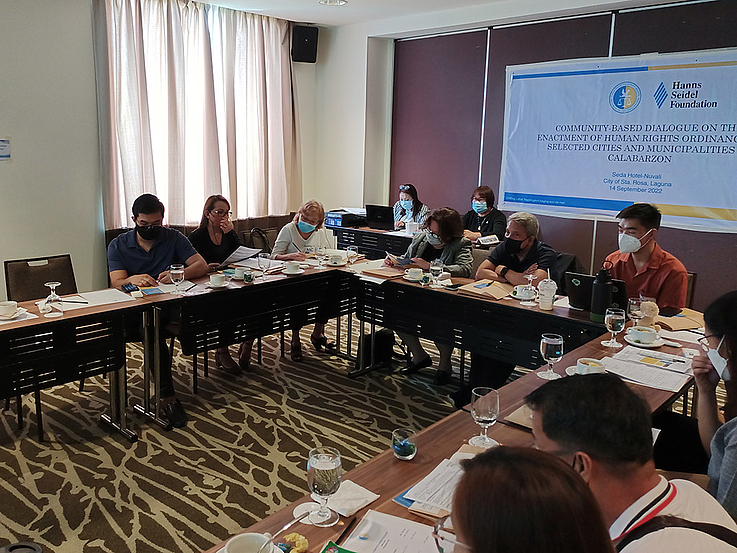On Community-based Dialogue (CBD) Project
CBD on the Enactment of Human Rights Ordinances in Selected Cities and Municipalities of CALABARZON (Cavite, Laguna, Batangas, Rizal, Quezon) Region (REGION IV-A)
HSF
It was attended by more than 25 participants from selected cities and municipalities of CALABARZON Region comprising of newly-elected local legislators and appointed legal officers; officers and staff of CHR IV-A led by its Regional Director, Atty. Rexford Guevarra, and a representative from the CHR Central Office (Human Rights Policy Advisory Office); and key representatives from partner organizations, namely, Alternative Law Groups (ALG) and Hanns Seidel Foundation/Germany (HSF).
During the Opening program, Regional Director Atty. Rex Guevarra gave the Opening Remarks. He emphasized two (2) truisms/statements: one is that of the State obligations (government institutions/agencies) to respect, protect and fulfill human rights, both at the local and national levels; two is the State’s positive duty/affirmative action to facilitate enjoyment of human rights of its citizens (e.g., provision of vaccines, human rights treaties, legislations) and its negative duty which prohibits the State to do certain actions that violate human rights. In this regard, he noted the important role of human rights officers and legal officers at the LGU. He shared the process of crafting an ordinance up to its implementation (down to the BHRACT or barangay human rights officers). He expressed his sincere gratitude to all the participants for attending the CBD amid their busy schedules.
HSF
It was an interesting discussion of the proposed ordinances as well as the sharing of enacted ordinances from key representatives of selected cities/municipalities, which were facilitated by key officers of CHR Region IV-A. Ms. Aileen Edades, Chief, Promotion and Advocacy Division (PAD) tackled “Establishing and Operationalizing the Barangay Human Rights Action Center Team (BHRACT); Atty. Jack Benigno Diamante, Legal Division (LD) handled the “Localization of Article 1 of Republic Act (RA) No. 11313 and “Establishment or Designation of Freedom Parks”; and Atty. Mila J. Punzalan-Sobreviñas, Legal Division talked about “Comprehensive Anti-Discrimination Ordinance.” The sharing of enacted ordinances came from the City Administrator of Sto. Tomas, Batangas (Hon. Severino Medalla) and the Municipal Legal Officer of Sta. Cruz, Laguna (Atty. Ronaldo Mariano).
It is worthy to note that about half of the participants from the local government units (LGUs) are young lawyers.
The participants shared the following inputs/feedback during the Open Forum:
HSF
(i) Taytay, Rizal LGU already passed an ordinance on RA 11313. It requested CHR’s assistance to explain to its “Sangguniang Bayan” (municipal council) the need to localize laws, for example, Safe Spaces Act. CHR explained that it is in the law itself and that after three (3) years from passage of the law (in 2018), safety audit will be conducted by the Department of the Interior and Local Government (DILG) to check LGUs’ compliance, adding that penalties can be adjusted accordingly but not below the minimum as stipulated by law.
(ii) San Pablo, Laguna LGU cited a sexual harassment incident that happened in a school. It requested CHR’s assistance for investigation, which the CHR agreed to in line with its mandate as Gender Ombud. The LGU representative informed the group that a public hearing is ongoing for the proposed BHRAC ordinance in every barangay.
(iii) On the query re. appointment of CHR Commissioners, the CHR regional director mentioned that while there is a delay, CHR appreciates President F. Marcos’ recent pronouncements which are consistent with human rights as well as the statements from Secretary Jesus Remulla of the Department of Justice (DOJ) and General Rodolfo Azurin, Chief of the Philippine National Police (PNP). He noted that maybe the Office of the President is undertaking a careful and deliberate vetting of the nominees, which, he said, are many including directors from CHR.
(iv) Sta. Cruz, Laguna LGU mentioned it passed a “Kasambahay” (household workers) ordinance. CHR noted this good initiative and underscored to make ordinances simple and understood by their constituents which can be promoted thru vlogs/ social media platforms.
(v) Sto. Tomas, Batangas City Administrator shared that CHR has a template for crafting an ordinance which can be adapted by LGUs.
(vi) Calamba, Laguna LGU shared a common perception that when human rights violations are committed by the PNP, CHR and human rights advocates are quick to condemn but not when these are committed by non-state actors such as the NPA. CHR stressed that human rights are universal, hence, human rights apply to all. CHR added that while the standard should be ‘equality,’ the reality is, it is not equal which is a challenge to public officials, thus, the need to pass ordinances to balance its application to all persons. CHR shared that assistance is being provided to police victims and commends swift action of the police.
(vii) Calamba, Laguna LGU requested CHR as resource person in their training/other activities, to which the latter agreed to.
(viii) Antipolo, Rizal LGU committed to pass ordinances on the abovementioned laws including HRAC (Human Rights Action Center) and ROL (Rule of Law).
(ix) ALG stated the need to monitor the implementation of the local ordinances and the appointment of sectoral representatives to local bodies.
(x) Tagaytay City, Cavite LGU asked if CHR can assist in property-related issues. CHR noted that while its mandate is limited to civil and political rights (CPR), it can provide legal assistance thru its lawyers and also referral to appropriate agencies. It underscored the fact that human rights are inter-related, thus, it cannot ignore ESCR issues.
(xi) CHR mentioned that it is part of the monitoring committee on demolitions.
(xii) CHR informed the group that it provides “after care” services, i.e., after the ordinances are passed, it supports capacity-building activities (i.e., training, promotional, etc.).
(xiii) CHR sought the support of the group to introduce/refer the CHR to any lawmaker who can champion the Anti-Discrimination Bill currently pending in Congress.
(xiv) CHR sought suggestions on future CBD participants. The group mentioned Provincial DILG officers, Department of Education (DepEd), private sector, and police officers.
The participants expressed their gratitude/appreciation for the conduct of the CBD and recommended to undertake the same at the provincial level given the limited knowledge on human rights of local government officers.
After the distribution of Certificates of Appreciation to the resource persons and Certificates of Participation to the participants, a group photo was taken for documentation purposes.
Photo Gallery




